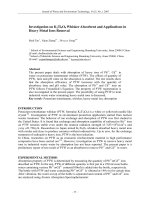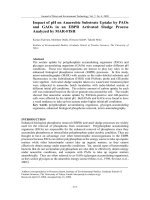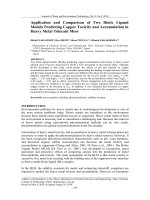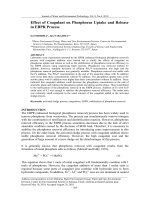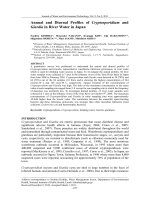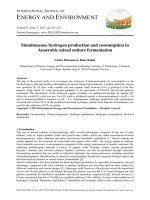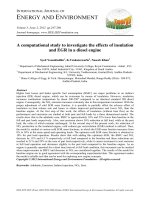- Trang chủ >>
- Khoa Học Tự Nhiên >>
- Vật lý
pascals wager pragmatic arguments and belief in god dec 2006
Bạn đang xem bản rút gọn của tài liệu. Xem và tải ngay bản đầy đủ của tài liệu tại đây (1.24 MB, 240 trang )
PASCAL’S WAGER
This page intentionally left blank
Pascal’s Wager
Pragmatic Arguments and Belief in God
JEFF JORDAN
CLARENDON PRESS · OXFORD
1
Great Clarendon Street, Oxford
Oxford University Press is a department of the University of Oxford.
It furthers the University’s objective of excellence in research, scholarship,
and education by publishing worldwide in
Oxford New York
Auckland Cape Town Dar es Salaam Hong Kong Karachi
Kuala Lumpur Madrid Melbourne Mexico City Nairobi
New Delhi Shanghai Taipei Toronto
With offices in
Argentina Austria Brazil Chile Czech Republic France Greece
Guatemala Hungary Italy Japan Poland Portugal Singapore
South Korea Switzerland Thailand Turkey Ukraine Vietnam
Oxford is a registered trade mark of Oxford University Press
in the UK and in certain other countries
Published in the United States
by Oxford University Press Inc., New York
Jeff Jordan 2006
The moral rights of the author have been asserted
Database right Oxford University Press (maker)
First published 2006
All rights reserved. No part of this publication may be reproduced,
stored in a retrieval system, or transmitted, in any form or by any means,
without the prior permission in writing of Oxford University Press,
or as expressly permitted by law, or under terms agreed with the appropriate
reprographics rights organization. Enquiries concerning reproduction
outside the scope of the above should be sent to the Rights Department,
Oxford University Press, at the address above
You must not circulate this book in any other binding or cover
and you must impose this same condition on any acquirer
British Library Cataloguing in Publication Data
Data available
Library of Congress Cataloging in Publication Data
Data available
Typeset by Laserwords Private Limited, Chennai, India
Printed in Great Britain
on acid-free paper by
Biddles Ltd., King’s Lynn, Norfolk
ISBN 0–19–929132–2 (Pbk.) 978–0–19–929132–8 (Pbk.)
13579108642
For Julia and Jacob Jordan
This page intentionally left blank
Preface
A disconnect exists between the arguments that philosophers find
interesting and the arguments actually employed by Christians and
other theists as reasons in support of their religious commitments.
Think of the Ontological argument. Books and articles aplenty are
directed toward it, yet few of those found in a pew would cite the
Ontological argument as a reason for their being a theist. Pragmatic
theistic arguments bridge the gap between the academy and the ‘real
world’, with theoretical issues in epistemology, the ethics of belief,
and decision theory enticing the specialist; while a practical strain of
common sense and familiarity draws the non-specialist.
In this book I investigate various theistic pragmatic arguments and the
objections employed against them. Special attention is paid to Pascal’s
Wager, as the most prominent example of a theistic pragmatic argument.
A result of this investigation is a new version of the Wager that I shall
call the ‘Jamesian Wager’, which survives the objections hurled against
theistic pragmatic arguments and provides strong support for theistic
belief.
I am grateful to the colleagues and friends who slogged through drafts
of the chapters found within and generously offered comments and
suggestions: Michael Almeida, Stephen T. Davis, Alan H
´
ajek, Andrew
Marx, Tom Morris, Joel Pust, Kate Rogers, William Rowe, Paul Saka,
and William Wainwright. I owe a deep debt of gratitude to Doug
Stalker for his unflagging encouragement, and sage advice, despite the
glacial pace of my writing. I also appreciate the support of those at OUP:
Peter Momtchiloff, Jacqueline Baker, Eva Nyika, Andrew Hawkey; and
Hilary Walford, who performed a heroic job of copyediting.
Several previous publications of mine have been extensively revised
and form the base upon which the superstructure of the book has
been raised. ‘Pascal’s Wagers’, Midwest Studies in Philosophy, 26 (2002),
213–23, forms part of Chapter 1, while ‘Pragmatic Arguments’, in P. L.
Quinn and C. Taliaferro (eds.), A Companion to Philosophy of Religion
(Oxford: Basil Blackwell Publishers, 1997), 352–59, and ‘Pragmatic
Arguments and Belief’, American Philosophical Quarterly, 33/4 (1996),
409–20, form parts of Chapter 2. Parts of Chapter 3 come from
‘The Many Gods Objection’, in Gambling on God: Essays on Pascal’s
viii Preface
Wager (Lanham, MD: Rowman & Littlefield Publishers, 1994), and
‘Pascal’s Wager Revisited’, Religious Studies, 34/4 (1998), 419–31. Bits
of Chapter 4 originated in ‘Duff and the Wager’, Analysis, 51 (1991),
174–6; ‘Pascal’s Wager and Infinite Utilities’, Faith and Philosophy, 10/1
(1993), 49–59, and ‘Pascal’s Wager and the St Petersburg Paradox’,
Philosophia, 23 (1994), 207–22, with ‘Hume, Tillotson, and Dialogue
XII’, Hume Studies, 18/2 (1991), 125–39, forming some of Chapter 5,
and ‘Pascal’s Wagers and James’s Will to Believe’, in W. Wainwright
(ed.), The Oxford Handbook for Philosophy of Religion (Oxford: Oxford
University Press, 2005), 168–87, providing a part of Chapter 6.
Contents
Abbreviations xi
Introduction: The Castaway’s Fire 1
1. A Preview 2
2. Excursus I: A Note on the Pens´ees Text 5
1. Pascal’s Wager 7
1. The Apologetic Role of the Wager 8
2. Decision-Making 10
3. A Family of Wagers 16
4. The Many-Gods Objection 26
5. The Logic of Pascal’s Wagers 29
6. The Maximin Version 31
7. What Is Ahead? 35
2. The Ethics of Belief 37
1. Doxastic Voluntarism 38
2. Two Kinds of Pragmatic Arguments 39
3. Six Kinds of Evidentialism 42
4. A Defense of Pragmatic Reasoning 47
5. Six Objections 53
6. All Things Considered? 61
7. The Cupidity Objection 64
8. Final Matters 69
9. Excursus II: Moral Arguments as Pragmatic Arguments 70
3. An Embarrassment of Riches? 73
1. The First Possibilist Formulation 77
2. The Second Possibilist Formulation 82
3. The Actualist Version and Ecumenicity 84
4. Escape of the Jamesian Wager 87
5. Three Steps to Success 95
6. The Kantian Gap 96
7. The Many-Theologies Objection 98
8. The Many-Gods Objection: A Eulogy 100
x Contents
4. The Problem of Infinite Utilities 102
1. The Indeterminacy Problem: Version One 103
2. The Indeterminacy Problem: Version Two 105
3. The Problem of the Priors or Natural Theology and the
Pascalian 109
4. The St Petersburg Paradox 110
5. The Wager and Standard Decision Theory 118
6. A Finite Wager? 123
7. Hyperreals to the Rescue? 125
8. As Things Stand 126
5. Showstoppers? 127
1. The Charge of Unworthiness 127
2. Mercenary Faith? 131
3. The Migration Problem 133
4. The Problem of Dwindling Markets 135
5. The Problem of Surpassable Saturation Points 140
6. Predestination and Pascalian Wagering 143
7. The Pascalian Divine Plan and Implausibility 146
8. The Impotence and Corruption of Otherworldliness 149
9. The Decadence of This-Worldliness 160
6. God, Hope, and Evidence 164
1. Evidence and Right Dispositions 166
2. James and the Will to Believe 174
3. The Topography of Hope 185
4. A License to Hope 187
5. Consolation and Hope 190
6. The Abdication of Belief 194
7. Excursus III: A Theology of Hope 196
7. Pragmatic Arguments and Belief in God 199
1. The Sounds of Silence 199
2. The Divine Hiddenness Argument 200
3. Why the Divine Hiddenness Argument Fails 206
4. Lighting the Fire 210
Bibliography 212
Index 223
Abbreviations
D. David Hume, Dialogues Concerning Natural Religion (1779), ed.
N. Kemp Smith (Indianapolis, IN: Bobbs-Merrill, 1947)
K. Blaise Pascal Pens´ees,trans.A.J.Krailsheimer(London:Penguin
Books, 1966)
L. Blaise Pascal Pens´ees, trans. Honor Levi (Oxford: Oxford University
Press, 1995)
T. John Tillotson, ‘The Wisdom of Being Religious’, Sermon I, in Works of
Tillotson, i (London: J. F. Dove, 1820), 317–89
W. Blaise Pascal Pens´ees, trans. John Warrington (London: J. M. Dent &
Sons, 1960)
This page intentionally left blank
Introduction
The Castaway’s Fire
A castaway builds a fire hoping to catch the attention of any ship or
plane that might be passing nearby. Even with no evidence that a plane
or ship is nearby, he still gathers driftwood and lights a fire, enhancing
the possibility of rescue. The castaway’s reasoning is pragmatic. The
benefit associated with fire building exceeds that of not building, and,
clearly, no one questions the wisdom of the action.
Of course, the castaway’s building of the fire does not require that
the castaway believes that it will be seen. It requires only a belief that
it might be seen. Now consider the question of God. What if there is
no strong evidence that God exists? May one believe, justifiably, that
God exists? Or is belief in the absence of strong supporting evidence
illegitimate and improper? Pragmatic arguments for theism are designed
to motivate and support belief even in the absence of strong evidential
support. These arguments seek to show that theistic belief is permissible,
even if one does not think that it is likely that God exists.¹ Theism is the
proposition that God exists. God we will understand as that individual,
if any, who is omnipotent, omniscient, and morally perfect. A theist is
anyone who believes that God exists.
Pragmatic arguments employ prudential reasons on behalf of their
conclusions. A prudential reason for a proposition is a reason to think
that believing that proposition would be beneficial. Other theistic
arguments—the Ontological proof or the Cosmological argument, for
example—provide epistemic reasons in support of theism. An epistemic
reason for a certain proposition is a reason to think that that proposition
is true or likely. The French philosopher and mathematician BlaisePascal
¹ Some versions of the Wager are intended to persuade, even if it is extremely unlikely
that God exists.
2 Pascal’s Wager
(1623–62) is famous, in part, for his contention that, if the evidence
is inconclusive, one can properly consult prudence: ‘your reason suffers
no more violence in choosing one rather than the other … but what
about your happiness? Let us weigh the gain and the loss involved by
Wagering that God exists’ (L. 153–6). According to Pascal, theistic
belief, because of its prudential benefits, defeats its doxastic rivals of
atheism and agnosticism. Pascal’s contention is encapsulated in what is
famously known as Pascal’s Wager.
Pascal’s Wager is the most prominent member of the family of
pragmatic arguments in support of theism. Another prominent member
of the family is found in the 1896 essay ‘The Will to Believe’, written
by the American philosopher William James (1842–1910). James’s
argument, as we will see, is concerned in large part with the immediate
benefits of cultivating theistic belief, rather than any alleged benefit in
the hereafter. This world is the primary concern, not the world to come.
Pragmatic theistic arguments are the focus of this study, with most of
our attention directed toward Pascal’s Wager. Devoting a majority of
our study to the Wager is natural enough, since issues in epistemology,
the ethics of belief, and decision theory, as well as theology, all intersect
at the Wager. But the Wager is not the exclusive focus of our study.
William James’s argument in support of theistic belief receives much
attention. As will a largely unknown pragmatic argument authored by
the English philosopher J. S. Mill (1806–73), published posthumously,
which supports the propriety of hoping that quasi-theism is true. These
arguments contend that certain positive attitudes—whether belief, or
acceptance, or hope—are properly attached to theism, because the
benefits associated with those positive attitudes exceed those associated
with disbelief or the suspension of belief.
1. A PREVIEW
Chapter 1 is an in-depth look at Pascal’s Wager. The logic involved in
the Wager is discussed, as is the basic topography of decision theory, the
systematic study of rational decision making. Seven different versions of
the Wager are identified, each corresponding to a significant landmark
of decision theory. Two versions of Pascal’s Wager will be earmarked
for close examination. One version is a favorite of philosophers, and so
it might be called the Canonical version of Pascal’s Wager. In short, the
Canonical Wager contends that, since there is everything to gain and
Introduction 3
very little to lose, the expected utility of forming theistic beliefs exceeds
that of not forming theistic beliefs, as long as it is logically possible that
God exists.² This version of the Wager enjoys favored status not because
philosophers believe it is sound. They generally do not. It is a favorite
among philosophers because it is such an audacious challenge to the idea
that, as David Hume might put it, a rational person conforms her beliefs
to the evidence. The Canonical Wager, I argue, falls prey to various
objections. The other version of the Wager, however—what I shall call
the Jamesian Wager —survives the gauntlet of challenges and objections
explored in Chapters 2–5. The Jamesian Wager, as we shall see, can
serve as a tie-breaker, such that anyone who has as much evidence for
atheism as she has for theism has, compliments of the Jamesian Wager,
a rational way of moving beyond that evidential impasse toward the
cultivation of theistic belief.
Theistic pragmatic arguments are controversial; some even find them
scandalous. In general, the objections to theistic pragmatic arguments
can be classified into three broad kinds: moral, methodological, and
theological. Moral objections to theistic pragmatic arguments are not
complaints that are particularly virtuous, but are complaints concerning
the virtue of pragmatic reasoning with regard to belief formation. Most
prominent are objections that pragmatic arguments violate an ethic of
belief—that it is immoral to form or maintain beliefs on the basis of
pragmatic reasons, rather than the evidence. The moral person, it is
alleged, cultivates her beliefs only with evidence. Another version of a
moral objection is that Pascal’s Wager exploits cupidity and selfishness.
In effect, moral objections allege that Pascalian Wagers, and pragmatic
arguments generally, entangle one in a morally problematic situation.
It is immoral, put simply, to generate beliefs on the basis of pragmatic
arguments. In Chapters 2 and 5, I argue that moral objections to
pragmatic reasoning generally, and to Pascal’s Wager specially, fail. For
one thing, it is possible that one could have a moral duty to engage in
pragmatic reasoning, to form and maintain a belief on the basis of a
pragmatic reason and in the absence of adequate evidence (indeed, even
in the face of contrary evidence). For another thing, as we will see, the
Wager can be formulated so as to appeal not to selfish greed, but to a
concern for others.
² See Chapter 1 for the details on the Canonical Wager, and the concept of maximizing
expected utility.
4 Pascal’s Wager
Methodological objections are the most perplexing for the friend of
the pragmatic. This kind of objection is a complaint about validity,
or, perhaps more precisely, a complaint arguing invalidity. Put simply,
methodological objections allege that pragmatic arguments contain an
argumentative flaw. Even if their premises are true, the conclusion of a
Pascalian Wager does not follow. The most famous example of this kind
of objection is the many-gods objection, which is also the complaint
most frequently lodged against the Wager. The Pascalian, according to
the many-gods objection, is left with an embarrassment of riches, as the
Wager recommends no particular deity, or theological tradition, but
many mutually incompatible ones. Another methodological objection is
that the notion of an infinite utility is incoherent or at least problematic,
since standard decision theory implies several theorems and principles
that are incompatible with infinite utilities. Chapters 3, 4, and 5 examine
various methodological objections. Chapter 3 looks at three versions of
the many-gods objection, while Chapter 4 examines several problems
that arise from the notion of an infinite utility. As we will see, both the
many-gods objection and objections to infinite utility are fatal to some
formulations of Pascal’s Wager. They are not, however, the bane of every
formulation, since the Jamesian Wager escapes these methodological
objections unscathed.
In Chapter 5 nine objections to Pascal’s Wager are examined. Seven
of these objections are classifiable as methodological objections, with the
other two being theological objections. A theological objection to the
Wager is a complaint that arises from the doctrines of Christianity. The
first such complaint is that the divine plan presupposed by the Wager
is implausible, since, the objection goes, God would not have designed
the world in the way that the Wager presupposes. The second is that
Pascalian wagering is incompatible with the doctrine of predestination.
As with the moral objections and the methodological objections,
these theological objections are not fatal complaints to the Jamesian
Wager.
Chapter 6 is one part examination of William James’s ‘Will to
Believe’ argument, one part examination of J. S. Mill’s ‘Religious Hope’
argument, and one part examination of the argument that the consoling
benefit of theistic belief is so great that theistic belief is permissible even
when one thinks that the existence of God is much less likely than not.
As we will see, while the consolations of theistic belief may be great,
they are not so great as to overcome the moral and epistemic duty not
to accept propositions that one takes to be much less likely than not.
Introduction 5
As mentioned earlier, it is the contention of this study that one version
of the Wager—the Jamesian Wager—survives the various objections
hurled against theistic pragmatic arguments. Indeed, I will argue that
the Jamesian Wager is valid, and there is strong evidence in support of
its premises. The Jamesian Wager, in other words, provides good reason
in support of theistic belief. The Jamesian Wager contends that benefits
associated with theistic belief hinge not just on a world to come, but also
on this world. According to the Jamesian Wager, theistic belief as such
is beneficial, whether God exists or not. If the castaway’s fire provides
warmth, and a means to cook, as well as a signal, then the castaway has
all the more reason to build the fire. Even if one finally denies that the
Jamesian Wager provides support for theistic belief, the study of theistic
pragmatic arguments is important, since grappling with the puzzles and
problems raised by the pragmatic is reason enough, and reward enough,
to undertake the study.
2. EXCURSUS I: A NOTE ON THE PENS
´
EES TEXT
Pascal’s Pens´ees (‘Thoughts’) was first published in 1670, eight years
after Pascal’s death. Pascal had intended to publish an apology for
Christianity, and the Pens´ees, a collection of unfinished notes and
jottings and fragments, is a very rough draft toward that end. A version
of the Wager, however, was published earlier, in the last chapter of The
Port-Royal Logic (1662). The unfinished nature of the Pens´ees generates
much dispute concerning the order in which Pascal intended to present
the various fragments. The fragment containing the Wager is entitled
‘Infini rien’ (‘infinity-nothing’) and is described by Ian Hacking as
‘two pieces of paper covered on both sides by handwriting going in all
directions, full of erasures, corrections, insertions, and afterthoughts’.³
Unfortunately, there is no uniform numbering of the Pens´ees frag-
ments in the various translations and editions of the Pens´ees,butthe
numbering employed by M. Louis Lafuma’s Delmas edition (Paris,
1948) is widely used. John Warrington in his English translation of
1960, Blaise Pascal Pens´ees (London: J. M. Dent & Sons, 1960), widely
available in the Everyman series, follows the Lafuma Delmas numbering
(in the Warrington text, the Infini rien fragment is 343). Complicating
³ Ian Hacking, ‘The Logic of Pascal’s Wager’, American Philosophical Quarterly,9/2
(1972), 187–8.
6 Pascal’s Wager
matters, Lafuma published a later edition that numbers the Pens´ees frag-
ments differently (the Luxembourg edition of 1951). Another widely
available English translation, part of the Penguin classics series, is that of
A. J. Krailsheimer, Blaise Pascal Pens´ees (London: Penguin Books, 1966),
which follows the Lafuma Luxembourg edition. The Infini rien passage
in the Krailsheimer translation is 418. A recent English translation by
Honor Levi, Pens´ees and Other Writings (Oxford: Oxford University
Press, 1995), follows a third order of numberings (that of Philippe
Sellier). In this translation Infini rien is numbered 680. Among older
English translations, for instance that of W. F. Trotter (Pascal’s Thoughts
(New York: Collier, 1910; also New York: Modern Library, 1941, and
New York: E. P. Dutton & Co., 1958), the numbering of Leon Brun-
schvicg is used, in which Infini rien is 233. Dover Publications, as part of
the Dover Philosophical Classics series, reissued the Trotter translation
in 2003. The Dover reissue includes an introduction by T. S. Eliot,
written in 1958.
In the chapters that follow I will cite references to the Pens´ees in the
text, using the fragment number and not page number. The Warrington
translation I will cite as (W. with fragment number). Whenever I stray
from the Warrington translation, and use the Krailsheimer translation I
will cite it as (K. with fragment number), and the Levi translation I cite
as (L. with fragment number).
1
Pascal’s Wager
Pascal’s Wager was a revolutionary apologetic device. The Wager is
not an argument that God exists. That sort of argument, the appeal to
evidence, whether empirical or conceptual, is the domain of the other
theistic arguments. Pascal’s Wager is an argument that belief in God is
pragmatically rational, that inculcating a belief in God is the response
dictated by prudence. To say that an action is pragmatically rational
implies that it is in one’s interests to do that action. In the absence
of conclusive evidence, Pascal contends, prudential rationality should
be our guide (L. 680). Pascal’s pragmatic turn, although foreshadowed
in earlier writers, was an attempt to argue that theistic belief was the
only proper attitude to adopt when faced with the question of God.
Because epistemic reason cannot determine whether God exists, it must
yield the field to prudential reason, which wins the day for theism.
Impressively enough, even though the evidence should be inconclusive
regarding theism, one would be irrational not to believe, if the Wager
succeeds. The Wager, at least in its original intent, is not a weapon
of the friendly theist; the Wager is intended to show that unbelief is
rationally impermissible. With this emphasis on the rationality of belief,
Pascal was a modern thinker in his concern with what it is that one
should believe.
The Wager presupposes a distinction between having reason to think
a certain proposition is true, and having reason to induce belief in
that proposition. Although a particular proposition may lack evidential
support, it could be that forming a belief in the proposition may be the
rational thing, all things considered, to do. So, if there is a greater benefit
associated with inducing theistic belief than with any of its competitors,
then inducing a belief that God exists is the rational thing to do.
Like the Ontological proof and the Cosmological argument, the
Wager is protean. Pascal himself formulated several versions of the
Wager. Three versions of the Wager are generally recognized within
8 Pascal’s Wager
the concise paragraphs of the Pens´ees.¹ In this chapter I argue that there
is a fourth found there also, a version that in many respects anticipates
the argument of William James in his 1896 essay ‘The Will to Believe’.²
This fourth version differs from the better-known three by having as a
premise the proposition that theistic belief is more rewarding than non-
belief, independent of whether God exists or not. The better-known
three focus exclusively on the benefit of theistic belief if God exists. As
we will see, a variant of this fourth Wager is the strongest of Pascal’s
Wagers. Let us begin with a brief overview of the apologetic role Pascal
intended for the Wager.
1. THE APOLOGETIC ROLE OF THE WAGER
While it is impossible to know the role in his projected apologetic
work Pascal intended for his Wagers, there are hints in the fragment
containing the Wager argument.³ The first hint is the sentence ‘let
us now speak according to natural lights’, while a second hint is the
use of the indefinite article, ‘if there is a God, he is infinitely beyond
our comprehension’.⁴ These sentences suggest that Pascal intended
¹ Ian Hacking, ‘The Logic of Pascal’s Wager’, American Philosophical Quarterly,9/2
(1972), 186–92.
² William James, ‘The Will to Believe’ (1896), in The Will to Believe and Other Essays
in Popular Philosophy (New York: Dover, 1956), 1–31. The standard interpretation
ofJames’sargumentisthatitisapragmaticargument.InChapter6Iexaminean
interpretation of James’s argument, which sees it both as a pragmatic argument, and as
an epistemic one.
³ While the present study is primarily a study of Pascal’s Wager as an argument and
is not a study of the historical context of the Wager, I do hazard a few speculations
concerning that context. For studies in English treating the Wager in its historical
context, the reader is well advised to consult two important books: David Wetsel, Pascal
and Disbelief: Catechesis and Conversion in the Pens´ees (Washington: Catholic University
of America Press, 1994), and Leslie Armour, ‘Infini Rien’: Pascal’s Wager and the Human
Paradox (Carbondale and Edwardsville, IL: Southern Illinois University Press, 1993).
See also John Ryan’s informative article ‘The Argument of the Wager in Pascal and
Others’, New Scholasticism, 19 (1945), 233–50. Nicholas Rescher provides an insightful
comment about alleged precursors to the Wager in Pascal’s Wager: A Study of Practical
Reasoning in Philosophical Theology (Notre Dame, IN: University of Notre Dame Press,
1985), 138–9 (n. 35). Roger Hazelton discusses Christian precursors to the Wager in a
very useful article, ‘Pascal’s Wager Argument’, in R. E. Cushman and E. Grislis (eds.),
The Heritage of Christian Thought: Essays in Honor of Robert Lowery Calhoun (New York:
Harper & Row, 1965), 108–26.
⁴ See Charles M. Natoli, ‘The Role of the Wager in Pascal’s Apologetics’, New
Scholasticism, 57 (1983), 98–106; and his Fire in the Dark: Essays on Pascal’s Pens´ees and
Provinciales (Rochester, NY: University of Rochester Press, 2005), 8–12.
Pascal’s Many Wagers 9
the Wagers as arguments for the rationality of theistic belief, and
not as arguments for the rationality of Christian belief. Theism is
the proposition that there exists an all-powerful, all-knowing, morally
perfect being. Judaism, Christianity, and Islam are all theistic religions.
It is likely that Pascal had in mind a two-step apologetic strategy. The
first step consisted primarily of the Wager employed as an ecumenical
argument in support of theism generally, with the second step being
arguments for Christianity in particular.
As an ecumenical argument in support of theism, the Wager was
designed to show that theistic belief of some sort was rational, while
appeals to fulfilled prophecy and to miracles were Pascal’s favored
routes by which his reader was to be led to Christianity. Many of the
Pens´ees fragments consist of arguments that either Christianity is the
true religion, or that it is superior to Judaism and Islam in significant
respects (see Pens´ees 235–76 in the Levi translation, for instance). If this
speculation is sound, then Pascal’s apology was very much in line with
the standard seventeenth- and eighteenth-century apologetic strategy of,
first, arguing that there is a god, and then, second, identifying which god
it is that exists. This is the strategy adopted by Robert Boyle (1627–91)
and by Bishop John Tillotson (1630–94), for instance, and by those,
like William Paley (1734–1805), who employed the design argument
to argue for a divine designer, and then used the argument from miracles
to identify that designer.⁵
As we shall see in Chapter 5, this two-step strategy may also explain
the focus of David Hume’s (1711–76) works on religion, with his
Dialogues directed toward the first step, and the essay contra miracle
reports directed toward the second. It also explains Immanuel Kant’s
(1724–1804) characterization of the Cosmological argument and the
Physicotheological argument as two-staged arguments, with the first
arguing from experience to the existence of a superior being, and the
second identifying that being with the ens realissimum.
One might object to this speculation of a Pascalian two-step that
theism as such—the bare proposition that God exists—cannot motivate
a Pascalian Wager, which does after all presuppose certain ideas of
afterlife (heaven certainly and perhaps hell). This objection is correct.
Pascal probably thought of theism as including more than the existence
⁵ See Boyle’s Final Causes (1688); Tillotson’s ‘The Wisdom of Being Religious’,
Sermon I, in Works of Tillotson, vol. i (London: J. F. Dove, 1820), 317–89; and Paley’s
A View of the Evidences of Christianity (1795), pt. 3, ch. 8.
10 Pascal’s Wager
of God. William Rowe has a helpful distinction between restricted
theism and expanded theism, which provides an idea of how we should
understand theism in the context of theistic pragmatic arguments:
Expanded theism is the view that [God] exists, conjoined with certain other
significant religious claims, claims about sin, redemption, a future life, a last
judgment, and the like. (Orthodox Christian theism is a version of expanded
theism.) Restricted theism is the view that [God exists], unaccompanied by
other, independent religious claims.
⁶
As a first-step argument for theism the Wager was probably an argument
for expanded theism and not the restricted kind. The expansion, how-
ever, was not so broad as to include the entirety of Christian doctrine,
but it probably does include certain propositions about afterlife possib-
ilities in addition to the proposition that God exists. The second step,
which includes the appeals to miracle reports and satisfied prophecies, is
the argument for full-blown Christian belief. So it is best to understand
Pascal as presenting a wager between naturalism and expanded theism,
and throughout the balance of this chapter and those that follow, by
theism we will mean some suitably expanded version of theism. Of
course, as critics have often gleefully pointed out since at least 1746,
there are various versions of expanded theism, and, indeed, various
versions of what we might call expanded ‘quasi-theism’ (propositions
asserting the existence of supernatural beings distinct from God). This
plethora of theistic expansions—what is known as the ‘many-gods
objection’—will be a focus in a later section of this chapter, and the
sole focus of Chapter 3.
2. DECISION-MAKING
Having an idea of the basic theory of decision-making greatly facilitates
understanding the Wager. The theory of decision-making codifies the
logic of rational action in situations in which one’s knowledge is limited.
The usual limitation is a lack of a reliable basis on which to know or
to estimate the objective probabilities of various states of the world. In
decision-making situations three elements are of importance: actions,
⁶ William L. Rowe, ‘The Empirical Argument from Evil’, in R. Audi and W. J.
Wainwright (eds.), Rationality, Religious Belief, & Moral Commitment (Ithaca, NY:
Cornell University Press, 1986), 239.
Pascal’s Many Wagers 11
states, and outcomes. Actions are the alternative ways of acting available
to the deliberator. States are ways the world might be. Outcomes are the
anticipated consequences or effects of each action if a particular state
occurs. A decision matrix (Fig. 1.1) usefully represents the relationships
of these elements. The outcomes will be arranged in cells, the number
of which depends on the number of acts and states (2 × 2, or 2 × 3, or
3 × 3 …). The cells are numbered sequentially from the upper left-hand
cell across (Fig. 1.2).
States
Actions Outcomes
Fig. 1.1.
F1
F3
Act 1
Act 2
F2
State 1 State 2
F4
Fig. 1.2.
For simplicity’s sake, let us stipulate that we are concerned only with
actions and states that are causally and probabilistically independent.
One’s actions, that is, do not causally influence which state obtains.
The deliberator values some outcomes; others he does not. ‘Utilities’
is the term employed to represent the worth of the various outcomes
for the deliberator. Some outcomes have a high value or utility for
the deliberator, some a low or even negative utility (a disutility).
Probabilities, or the likelihood, whether objective or epistemic, of the
various states play a large role in decision-making. If one knows the
relevant probabilities (the risk involved), then a well-established rule is
available: the Expectation rule. According to the Expectation rule, for
any person S, and any number of alternative actions, α and β,availableto
S, if α has a greater expected utility than does β, S should choose α.One
calculates the expected utility of an act ϕ by (i) multiplying the utility
12 Pascal’s Wager
and probability of each outcome associated with ϕ, (ii) subtracting any
respective costs, and then (iii) summing the totals. So, for example,
suppose one were deciding whether to carry an umbrella today. One
prefers not to do so, but one also prefers even more not to get wet.
We can use a 2 × 2 (two actions and two states) matrix to model these
preferences, with the numbers within the cells representing the agent’s
preferences ranking of the various outcomes (the higher the number the
greater the preference) (Fig. 1.3).
10
1
Carry
Do not carry
2
Rain No rain
5
Fig. 1.3.
Suppose there is a 50 percent chance of rain today. The expected
utility (EU) of carrying an umbrella is greater than that of not carrying,
since:
1
/
2
(10) +
1
/
2
(2) = 6 = EU (carry)
1
/
2
( 1) +
1
/
2
(5) = 3 = EU (do not carry)
This kind of decision-making or deliberation with knowledge (or
estimation) of the relevant probabilities and utilities of the outcomes
is what is known as ‘decisions under risk’. So, if one deliberates armed
with knowledge of both the outcomes and the probabilities associated
with those outcomes, one faces a decision under risk (Fig. 1.4).
Outcomes
utilities
Actions = Expected utilities
States
probabilities
Fig. 1.4.

